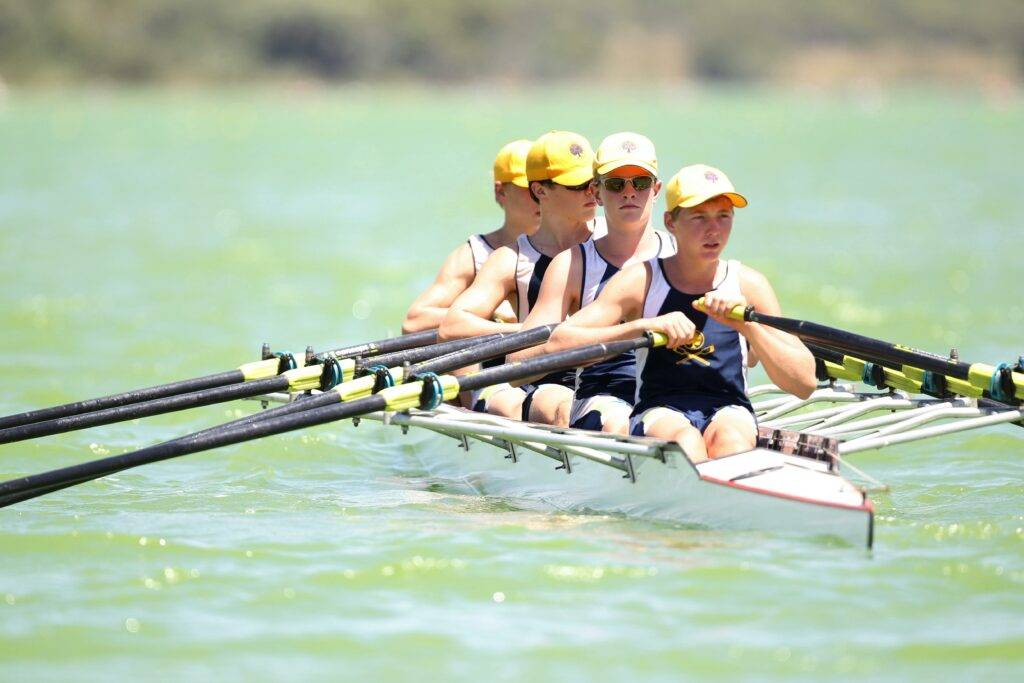Pathway to Men's
Rowing Recruitment
Is Rowing in College Your Goal?
Rowing is one of the oldest sports in history, dating back to ancient Egypt, and remains a prestigious athletic pursuit in college. The Harvard-Yale Regatta, the oldest college sporting event in the U.S., began in 1852. Competing in college rowing offers student-athletes tremendous opportunities, from receiving a world-class education to competing at the highest levels of the sport.
To be recruited for men’s college rowing, athletes must not only excel on the water but also maintain strong academics and understand the recruitment process. From selecting the right colleges and contacting coaches to improving 2k erg times, the path to college rowing requires dedication and a clear plan. Athlete Pipeline provides the tools and resources you need to navigate the entire rowing recruitment process.
Men’s College Rowing Recruiting Rules and Timeline
While men’s collegiate rowing isn’t an NCAA-sanctioned sport, many programs under the Intercollegiate Rowing Association (IRA) follow NCAA-like recruiting guidelines. Understanding when and how coaches can contact athletes is key. College rowing recruitment typically follows a structured timeline, and it’s crucial for rowers to begin preparing early, often before their junior year of high school. Athlete Pipeline keeps you informed of important deadlines, helping you stay on track throughout the recruiting process.
Men’s Rowing Times
One of the most important metrics in college rowing recruitment is your 2k erg time. Coaches often use this standardized test to compare rowers’ potential across programs. College rowers are typically tall, physically strong, and boast impressive 2k erg times. While factors like height and weight are considered, your 2k time is often the deciding factor. With Athlete Pipeline, you can track and showcase your progress, ensuring that coaches see your improvements and potential.
Men’s Rowing Scholarships and Financial Aid
Rowing scholarships are available, but they’re only offered at specific division levels. For instance, Ivy League and NCAA Division 3 schools don’t offer athletic scholarships, though academic or need-based financial aid may be available. Athletes can still receive partial or full scholarships at other schools, making it essential to understand where and how to look for financial aid. Athlete Pipeline helps you identify scholarship opportunities, boosting your chances of financial support.
Men’s College Rowing Camps
Attending rowing camps is a great way to refine your skills and gain exposure to college coaches. These camps are especially valuable for rowers from areas with limited access to the sport or for beginners looking to learn more about collegiate rowing. Camps not only enhance your technique but also provide an inside look at how college teams operate. Athlete Pipeline allows you to explore upcoming camps and ensure you’re targeting the right opportunities for exposure.
Men’s Rowing Walk-ons
Many college rowing programs offer spots for walk-ons—athletes who may not have rowed in high school but show the potential to succeed at the collegiate level. Walk-on tryouts are rigorous and focus on technique, endurance, and erg times. Taller athletes with strong erg performances often have an advantage. Walk-ons play an essential role in many college teams, and with proper preparation through Athlete Pipeline, you can earn your place on the roster.
Colleges with Men’s Rowing
There are approximately 84 varsity men’s rowing programs across the U.S., along with over 70 club teams. While club teams frequently compete against varsity squads, some even outperform them at national events. Many of these teams participate in prestigious competitions like the Henley Royal Regatta in England. Athlete Pipeline helps you explore these programs and find the best fit for your rowing and academic goals.
Men’s College Rowing Rankings
Rankings from sources like Row2k and cMax provide valuable insights into the top men’s rowing programs. These rankings compare results from both varsity and club teams, giving a relative view of each team’s speed and success. Some club teams even surpass varsity programs in competitions. Combine these rankings with Athlete Pipeline‘s comprehensive tools to find the best academic and athletic fit for your college rowing career.
Final Thoughts
Navigating the college rowing recruitment process can be challenging, but with the right guidance and resources, you can find the perfect program to match your talents and ambitions. Athlete Pipeline is here to help you showcase your skills, track your progress, and connect with coaches. Start building your profile today and take control of your rowing recruitment journey!

